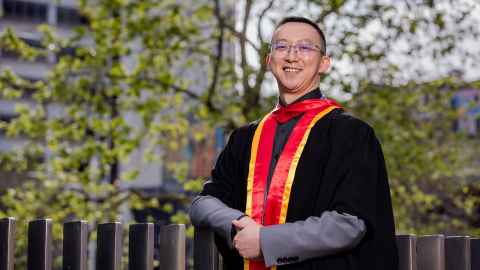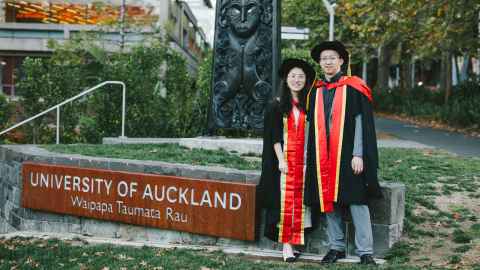Stormy nature of atmospheric rivers explored in PhD study
5 September 2024
Dr Ted Shu examined the role of atmospheric rivers in New Zealand as both a crucial water source and a cause of extreme weather.

As climate change reshapes global weather patterns, understanding atmospheric rivers is vital for protecting Aotearoa New Zealand's water resources and communities, says University of Auckland graduate Dr Jingxiang (Ted) Shu.
Ted graduated with his PhD in Engineering on 4 September with a thesis that explored the powerful influence of atmospheric rivers on New Zealand’s weather, revealing their dual role as both a vital water source and a potential cause of extreme weather events.
Atmospheric rivers are long, narrow corridors in the atmosphere that carry massive amounts of water vapour, comparable to the flow of the Amazon River but in the sky. They are responsible for significant rainfall when they make landfall, especially in midlatitude regions like New Zealand.
According to the study, which utilised data from over 500 rain gauge sites across the country, atmospheric rivers affect the country an average of 70 to 90 days each year, with more frequent and intense events occurring in summer.
The study also found that atmospheric rivers primarily make landfall along the western coastlines of both the North and South Islands, bringing rainfall which is vital for supporting New Zealand’s water supplies, agriculture and hydropower.
However, the same atmospheric rivers that sustain the country's water resources can also lead to extreme weather events, says Ted.
When they strike with high intensity, atmospheric rivers can unleash heavy rainfall capable of causing severe flooding, particularly in areas like the central-western regions of the North Island and the western parts of the South Island.
Ted says that during these extreme events, atmospheric rivers can deliver two to three times more rainfall than usual, underscoring their potential to overwhelm local infrastructure and communities.
“This emphasises the importance of understanding and monitoring atmospheric rivers as climate change is expected to increase their frequency and intensity,” he says.

To help address the complex nature of these weather events, Ted used an atmospheric river impact ranking scale, categorising events from beneficial (those that contribute to water resources without causing harm) to hazardous (those likely to cause significant flooding).
He says using this tool can help with weather forecasting, disaster preparedness and water management in New Zealand, especially as weather-related hazards like floods and droughts can have significant economic and societal impacts.
“This tool could enhance reservoir operation strategies, which rely heavily on accurate rainfall predictions. Better detection and classification systems could also improve early warning systems for extreme weather events, helping communities prepare for potential disasters.”
However, Ted says a major challenge is the need for more research to fully grasp the impact of atmospheric rivers on New Zealand.
“To advance our knowledge of atmospheric rivers, more comprehensive research and funding are essential. While countries like the US have invested heavily in this area, New Zealand needs increased support over a long-term period.”
Ted completed a bachelors degree in hydraulic engineering in China before moving to New Zealand to complete his masters and PhD in the Faculty of Engineering.
“I moved here because I heard the natural environment and the Kiwi culture was quite nice. Even though hadn't been here before, I decided to just go for it.”
His studies also led him to his partner Jingjing Liang, whom he met during a badminton night organised by the University. In May, she earned her PhD in Education from the Faculty of Education and Social Work.
“I’ve met a lot of great people here and received a lot of help during my studies,” says Ted. “Most importantly, I met my love here. I feel lucky to study and live in New Zealand.”
Media contact
Hussein Moses | Media adviser
M: 027 361 1000
E: hussein.moses@auckland.ac.nz